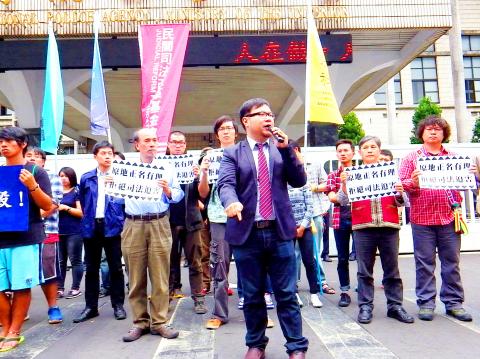Aboriginal and civic groups yesterday accused the government of conducting a “political witch hunt” with its pursuit of activists who spray-painted the Guangfu Township (光復) Office building in Hualien County to demand the restoration of Aboriginal names to tribal areas.
Early on Oct. 19, the Fa-Ta Alliance for Attack and Defense (馬太攻守聯盟), an Aboriginal group with members from the local Fataan and Tafalong communities in Hualien, painted graffiti on the facade of the office reading: “The land is the eternal nation” and “Whose restoration [(光復, guangfu)]? Names [of places] should be left to the master of the land,” along with the Aboriginal names of the two tribes.
Guangfu literally means “glorious restoration” or “glorious retrocession,” and is used by the Chinese Nationalist Party (KMT) regime to refer to the takeover of Taiwan from the Japanese after World War II.

Photo courtesy of the Association for Taiwan Indigenous Peoples’ Policy
However, the Association for Taiwan Indigenous People’s Policy that organized yesterday’s rally said that local police and prosecutors have since that day been harassing members of the alliance, their supporters and other Aborigines with telephone calls and verbal threats, causing great stress to their families and friends.
The association and more than half a dozen civic groups at the protest in front of the National Police Agency office in Taipei accused the government of “state violence.”
Chen I-chen (陳以箴), an Aboriginal rights advocate from the Makatao community who participated in the spray-painting protest, apologized to her people for “failing to tear down the township office’s name plaque all together.”
Association executive chief Yapasuyongu Akuyana said that giving places their rightful Aboriginal names is a “duty” of the state, not a “favor.”
“Rectification of names of traditional Aboriginal regions is the first step toward transitional justice for Taiwanese Aborigines,” Yapasuyongu Akuyana said.
“The spray-painting action is not an individual case; it is a product of history, an action by Aborigines in pursuit of self-identity and to right their names in history,” association president Oto Micyang said.
Echoing Omi Wilang, secretary-general of the Indigenous Peoples’ Action Coalition Taiwan, who said that the name Guangfu was assigned to the town without a full discussion with local Aborigines, Restoration of Taiwan Social Justice (臺左維新) chief executive Lin Yu-lun (林于倫) called the protest “an act of cleansing, rather than vandalizing; to clean off the pollution generated by 60 years of state colonization.”
Taiwan Referendum Alliance convener Tsay Ting-kuei (蔡丁貴) “confessed his sins” at the news conference, saying that as a non-Aboriginal Taiwanese, he is “an accomplice to the crime if name rectification is considered one.”
He added that in Canada, Aborigines are referred to as First Nations and Taiwan has from the outset belonged to Aborigines.
“This is not a crime of vandalism, but one of state officials’ dereliction of duty, for the Republic of China officials have failed to abide by the Indigenous Peoples Basic Act (原住民基本法),” he said.
Article 11 of the law stipulates that the government “shall restore the traditional names of indigenous tribes, rivers and mountains in indigenous peoples’ regions in accordance with the will of indigenous peoples.”

The Taiwanese passport ranked 33rd in a global listing of passports by convenience this month, rising three places from last month’s ranking, but matching its position in January last year. The Henley Passport Index, an international ranking of passports by the number of designations its holder can travel to without a visa, showed that the Taiwan passport enables holders to travel to 139 countries and territories without a visa. Singapore’s passport was ranked the most powerful with visa-free access to 192 destinations out of 227, according to the index published on Tuesday by UK-based migration investment consultancy firm Henley and Partners. Japan’s and

NATIONAL SECURITY THREAT: An official said that Guan Guan’s comments had gone beyond the threshold of free speech, as she advocated for the destruction of the ROC China-born media influencer Guan Guan’s (關關) residency permit has been revoked for repeatedly posting pro-China content that threatens national security, the National Immigration Agency said yesterday. Guan Guan has said many controversial things in her videos posted to Douyin (抖音), including “the red flag will soon be painted all over Taiwan” and “Taiwan is an inseparable part of China,” while expressing hope for expedited “reunification.” The agency received multiple reports alleging that Guan Guan had advocated for armed reunification last year. After investigating, the agency last month issued a notice requiring her to appear and account for her actions. Guan Guan appeared as required,

Japan and the Philippines yesterday signed a defense pact that would allow the tax-free provision of ammunition, fuel, food and other necessities when their forces stage joint training to boost deterrence against China’s growing aggression in the region and to bolster their preparation for natural disasters. Japan has faced increasing political, trade and security tensions with China, which was angered by Japanese Prime Minister Sanae Takaichi’s remark that a Chinese attack on Taiwan would be a survival-threatening situation for Japan, triggering a military response. Japan and the Philippines have also had separate territorial conflicts with Beijing in the East and South China

A strong cold air mass is expected to arrive tonight, bringing a change in weather and a drop in temperature, the Central Weather Administration (CWA) said. The coldest time would be early on Thursday morning, with temperatures in some areas dipping as low as 8°C, it said. Daytime highs yesterday were 22°C to 24°C in northern and eastern Taiwan, and about 25°C to 28°C in the central and southern regions, it said. However, nighttime lows would dip to about 15°C to 16°C in central and northern Taiwan as well as the northeast, and 17°C to 19°C elsewhere, it said. Tropical Storm Nokaen, currently